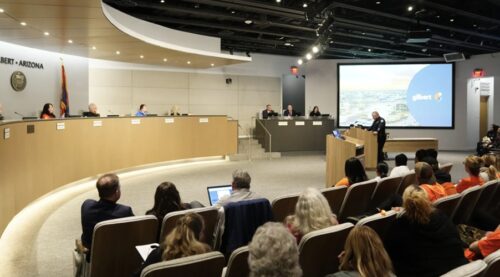
12.26.24 – gilbertsunnews.com -By Aparna Sekhar, GSN Staff Writer
The Gilbert Police Department will have to contend with fining itself for false alarms at its own buildings.
The department last week got the go-ahead from Council on its requests to toughen various noise, parking and bicycle-related rules in Gilbert, but was denied an exemption from fining itself for three or more false alarms at its facilities.
Assistant Police Chief Michael Angstead said the municipal code currently states that if a business or organization has three or more false alarms in a calendar year, police can cite the building owner.
But that penalty also has applied to the Police Department, which wanted an exemption.
“Currently, as an example, we have an alarm on our property and evidence building,” Angstead said. “And it’ll go off from time to time because rabbits will get out into the open part of the facility, where we can’t have people running around because there’s evidence outside.”
The department then dispatches an officer to investigate the alarm. The department also notes the number of such false alarms in a year, and fines itself, cutting a check to the town, Angstead said.
The department proposed an amendment to the rule will exempt the fines for these false alarms not only on town-owned buildings but also county, state and federal buildings.
Councilwoman Kathy Tilque opposed the request.
“I always believe that if we pass a law to regulate and fine businesses, we should hold ourselves accountable to the same standard,” she said.
“While I understand it seems redundant to process fines within internal departments, the bigger issue is, why do we have this law in place to begin with?”
Councilman Chuck Bongiovanni agreed with Tilque, stating that if the residents and businesses have to follow the rules, so should the town.
The rest of the council also chose to follow Tilque’s lead and denied the request.
Tilque also opposed a modified version of the amendment that would have exempted other government entities’ buildings.
“I’m prepared to let this die right here,” she said.
Some other changes to town ordinances requested by Gilbert PD had unanimous approval from the council.
Angstead explained that under Gilbert’s obstruction of public property laws, the department wanted to add language to prohibit anyone from staying at a town-owned bus shelter or transport facility for longer than an hour.
“We don’t want anybody to set up camp at a bus stop, and it provides a mechanism for officers to contact people if they are seen at the bus stop all day,” he said.
Another restriction that was approved by the council requires motorists to park within the markings of parking spots.
With this addition to the town code, Angstead said that citizens will be expected to park their vehicles within a single space unless it’s a larger vehicle. In that case, they would be required to utilize the fewest spaces possible to fit it.
“You will see as you drive around town, there are people that are inconsiderate,” he said. “It also becomes an issue downtown when we have angled parking in front of some of the businesses.”
Gilbert residents will also now have to start following the lighting and reflector regulations, previously set for bicycles only, for all electric bicycles, motorized bicycles and mopeds, whether or not they are used on town roads.
“Most people have little red lights on the back so that vehicles can see them,” Angstead said.
“It’s super dangerous,” he said “It’s dark in certain areas, especially along Recker and Baseline, for example, and we want people to be able to see pedal cyclists.”
Bongiovanni wanted to know the plans the department has in place to inform residents of the changed rules if passed by council.
Angstead said that in addition to the information via the town website, officers also seek to educate the public before beginning to enforce the new rules and issue citations.
Councilwoman Yung Koprowski requested the department to look into providing kits with the lights for citizens who might not have them and are stopped.
